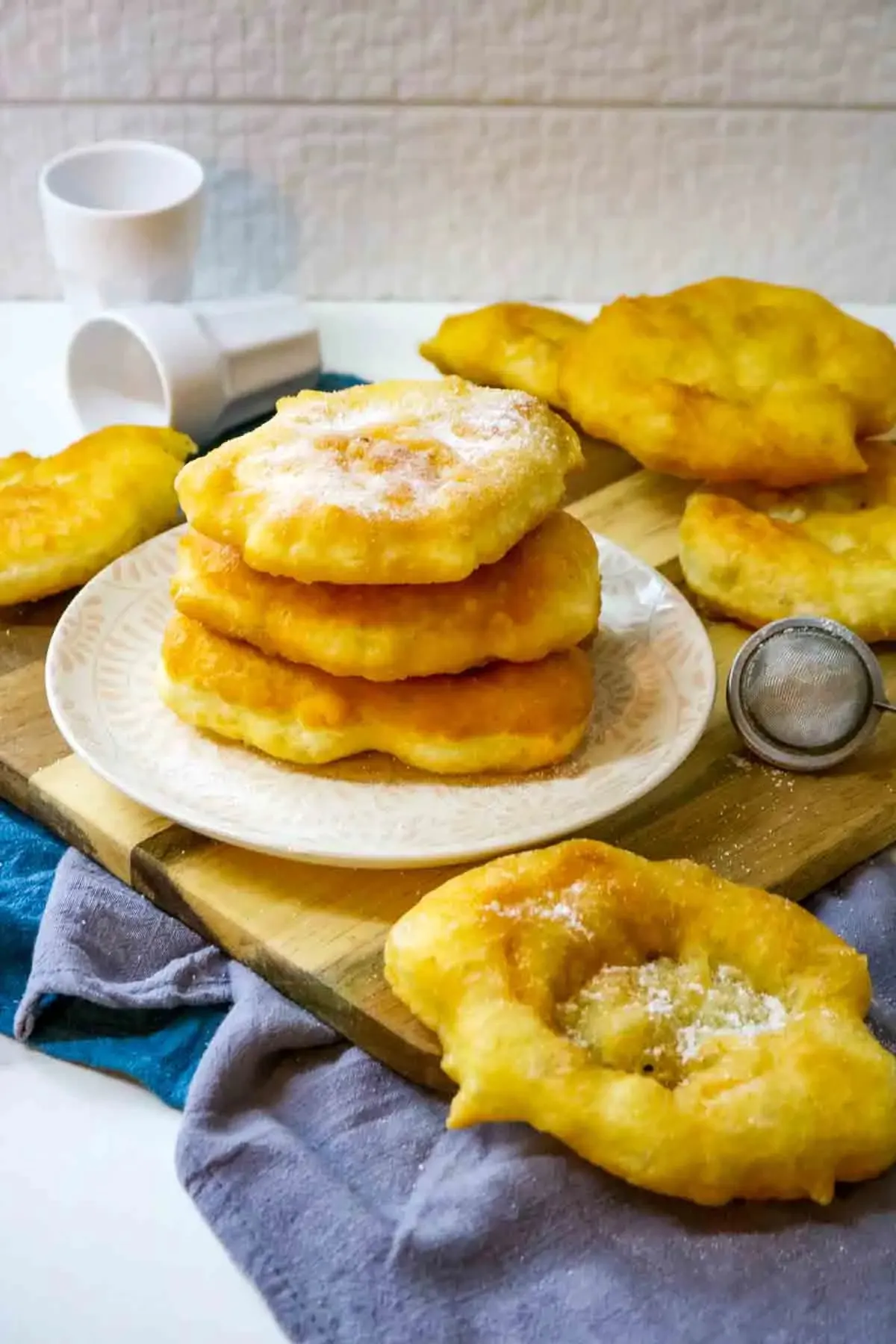Whether you’re a meat lover, vegetarian, or have a sweet tooth, traditional Bulgarian food has it all.
Bulgaria, a country in Southeastern Europe near the Black Sea, has a rich culinary tradition. It’s a delightful mix of Mediterranean, Ottoman, and Eastern European tastes.
Jump to:
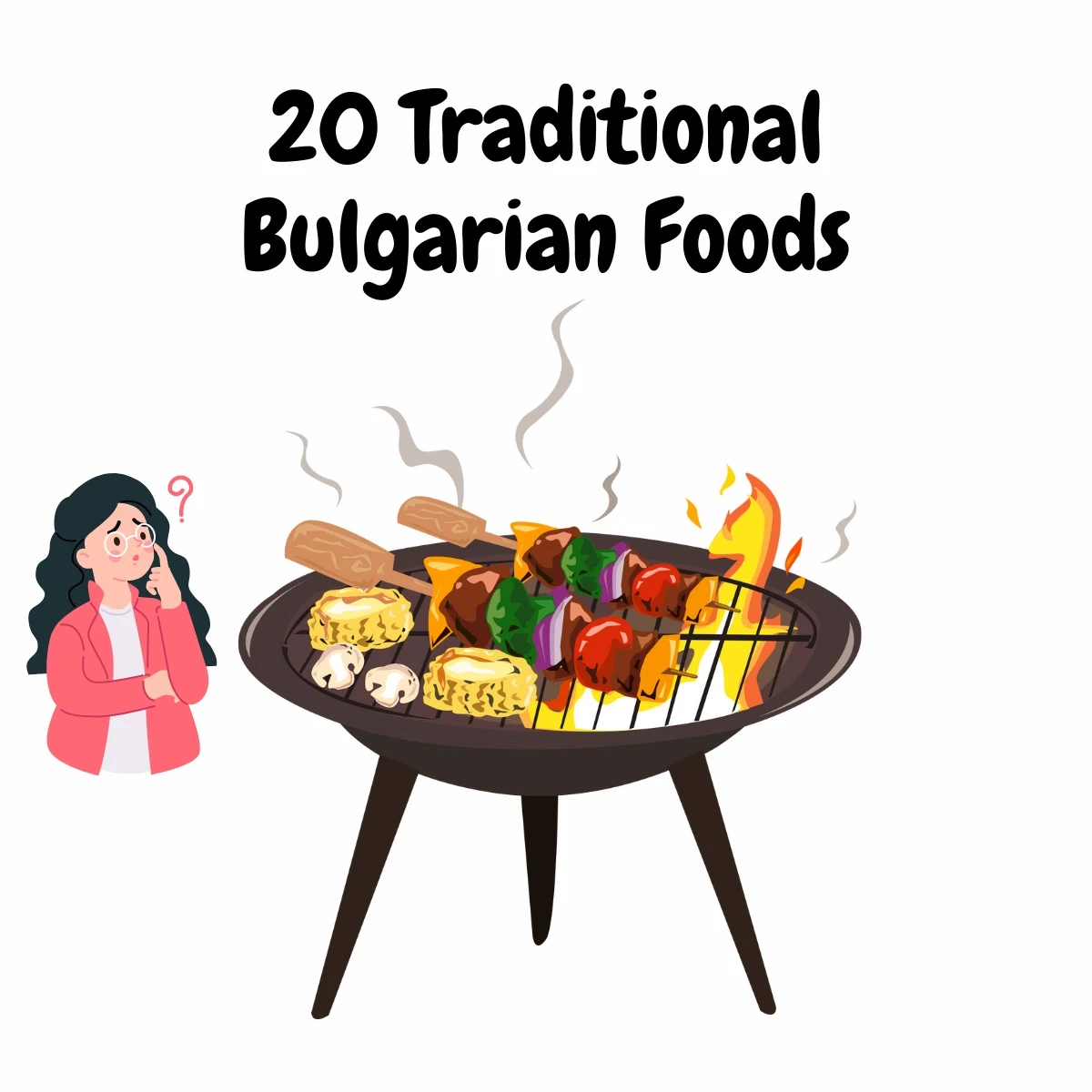
So let’s learn more about Bulgarian cuisine and its must-try offerings.
Pastries are my personal favorite but everything else is just as good!
Best Traditional Bulgarian Food
I don’t want you to get lost among all these lovely ideas, so let’s break them up into some categories starting with appetizers and side dishes.
🥗Bulgarian Starters and Side Dishes
Looking for something to start your meal? Check out these light options for starters and side dishes!
Shopska Salata
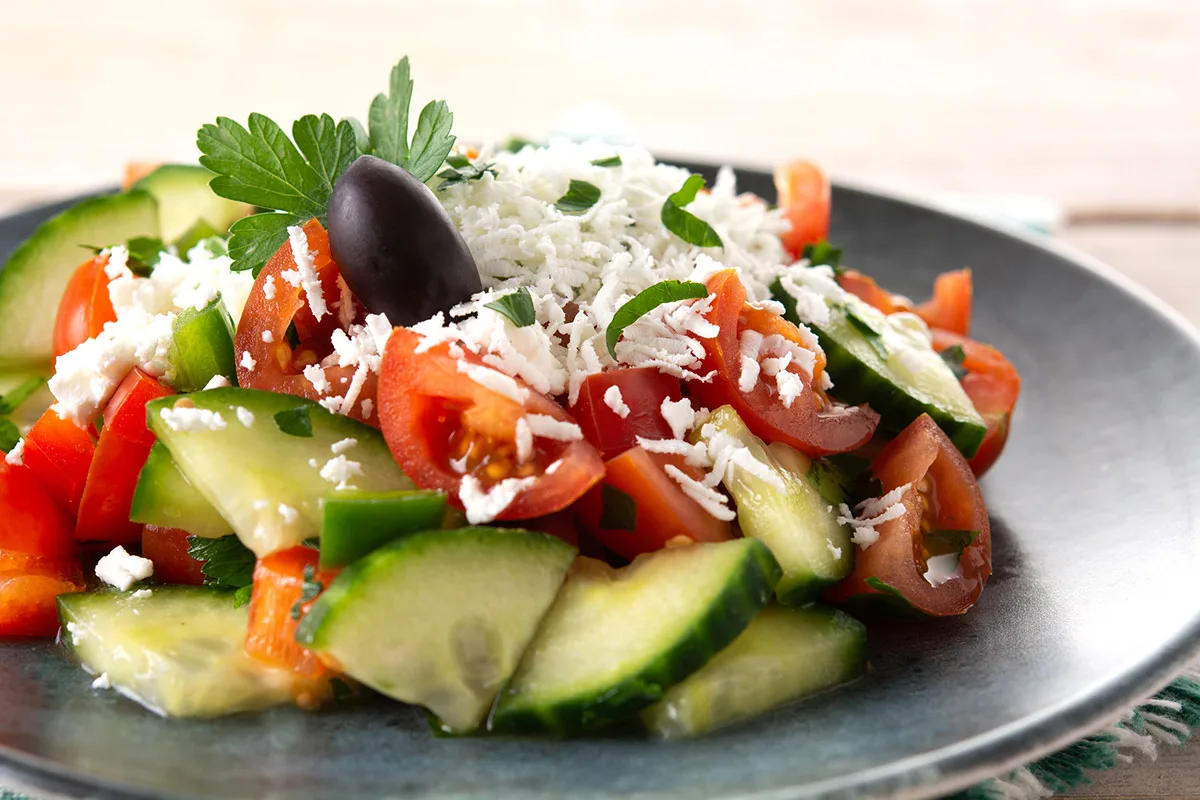
Simple, fresh, and flavorful—that is the description of Shopska Salata, a most famous Bulgarian salad.
Typical ingredients include chopped tomatoes, cucumbers, onions, and bell peppers, with feta cheese and parsley on top. It’s seasoned with vinegar and olive oil.
This cold salad is ideal for those steamy summer days thanks to its refreshing flavors and vitamins.
Snezhanka Salata (Snow White Salad)

Snezhanka Salata, or Snow White Salad, is prepared with cucumbers, garlic, and strained yogurt. It can also have some oil, dill, roasted peppers, walnuts and parsley.
It’s named “Snow White Salad” because the yogurt dressing is white like snow. Some call it milk salad or dry tarator salad.
Bulgarian cuisine serves this light salad as a side dish or snack on hot summer days. You can often see it served in scoops like ice cream.
Mish-Mash

Traditional Bulgarian Mish-Mash has scrambled eggs, peppers, tomatoes, and cheese (often sirene cheese). It’s a popular Bulgarian breakfast or brunch option for spring.
The recipe can also be tweaked with onions, carrots, scallions and more.
Lyutenitsa

Lyutenitsa, a Bulgarian spread, includes roasted peppers, eggplant, tomatoes, and carrots seasoned with garlic and spices. Bulgarians use it to spread bread or dip veggies.
It’s usually created with fresh ingredients and cooked slowly to bring out the best in vegetables.
🍖Bulgarian Meats and Mains
Meat lovers in Bulgaria have many alternatives, from traditional kebapche and kyufte to gourmet sausages and charcuterie.
Bulgarian grilled meatballs, or kyufte, contain ground beef or pork, onions, garlic, and herbs and spices. The meatballs are grilled till browned and cooked through.
Kyufte are a popular Bulgarian BBQ meal paired with Shopska salad.
A classic Balkan rice dish, drob sarma, contains finely chopped lamb offal, fresh herbs, and aromatic spices.
This recipe uses lamb liver and adds mushrooms to the mix. Originally it was a stuffing for roasted lamb, but now it’s a great main or side.
Sarmi (Stuffed Grape Leaves)

Sarmi—stuffed grape or cabbage leaves—is a classic Middle Eastern and Mediterranean meal.
The leaves are filled with rice, ground meat, herbs, and spices. They make an excellent appetizer or dinner.
Kebapche

Traditional Bulgarian kebapche is grilled minced meat prepared from ground beef and pork with spices and herbs.
The pork mixture is formed into long sausages and then grilled. Kebapche is often served with fresh salad, roasted veggies, and paprika.
Meshana Skara (Mixed Grill)

Meshana skara, or mixed grill, is a famous Balkan meal using grilled meats. It includes kebapche, kyufte, pork steak, and shishche (skewer).
If you’re looking for a hearty lunch for meat lovers, try mixed grill with roasted vegetables, fries, or salad.
Bulgarian Moussaka

Bulgarian moussaka, like Greek moussaka, is a substantial, cold-weather dinner. The difference between the two is that Bulgarian moussaka is made with potatoes instead of aubergine.
I definitely recommend trying this Bulgarian version if you’re looking for something special.
🍲Bulgarian Soups and Stews
Soups have to be on the Bulgarian food list as there are some exciting ideas to try!
This Bulgarian soup is recognized for its hearty taste. Peppers, tomatoes, bacon and eggs are the main ingredients in this recipe.
It’s a comforting recipe with smoky flavors and a hint of spice.
Tarator
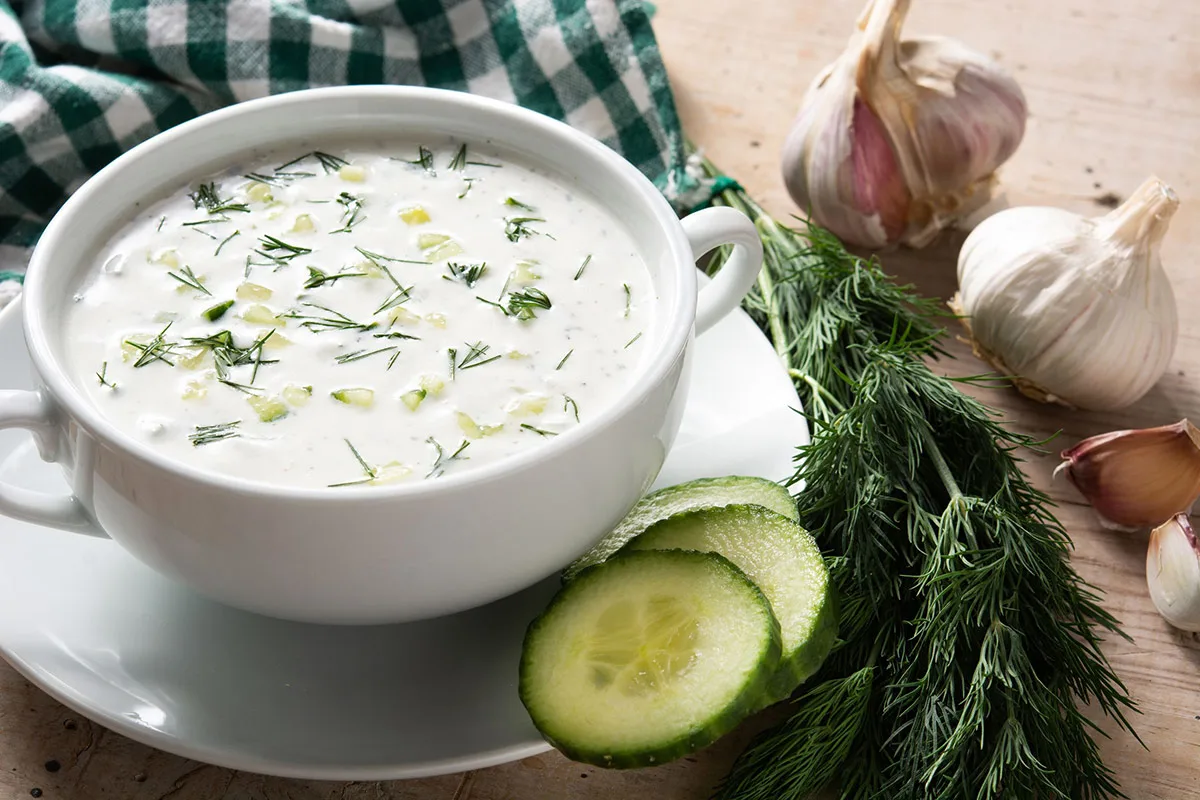
Traditional Bulgarian cold soup tarator is great for summer. It contains yogurt, cucumbers, garlic, dill, and walnuts. This cold soup is great as an appetizer or light meal.
Tarator soup is also healthy since yogurt has probiotics and cucumbers are hydrating and low in calories.
Shkembe Chorba (Tripe Soup)

Bulgarian tripe soup, or shkembe chorba, is a traditional recipe with pork, beef or lamb tripe. It’s seasoned with garlic, paprika, and vinegar.
This soup has a tangy and savory taste best enjoyed with a side of bread or a dollop of yogurt. It’s also a common hangover cure.
Bob Chorba (Bean Soup)

Bulgarian bean soup, bob chorba, is nourishing, and tasty. It’s made with dry beans, onions, carrots, and tomatoes.
This soup is also unique for having chubritza or dzhodzhen (spearmint).
Don’t forget to soak the dry beans overnight before you start making this lovely comfort food.
🍰Bulgarian Pastries and Desserts
Bulgarian has many delicious dessert options and I’ll cover the most popular ones here.
Mekitsi, deep-fried dough nibbles with soft powder sugar or jam, are a popular Bulgarian street food.
Three simple ingredients—white flour, yogurt, and baking soda—create these fluffy, golden-brown pastries.
Mekitsi are one of the most loved Bulgarian snacks or breakfasts.
A Christmas-popular Bulgarian bread is called “pitka”. This soft, crispy side dish is often served with meals, used to soak up sauces, or offered at special events.
Bulgarians enjoy pitka with cheese, spreads, or jams for a quick snack.
Banitsa
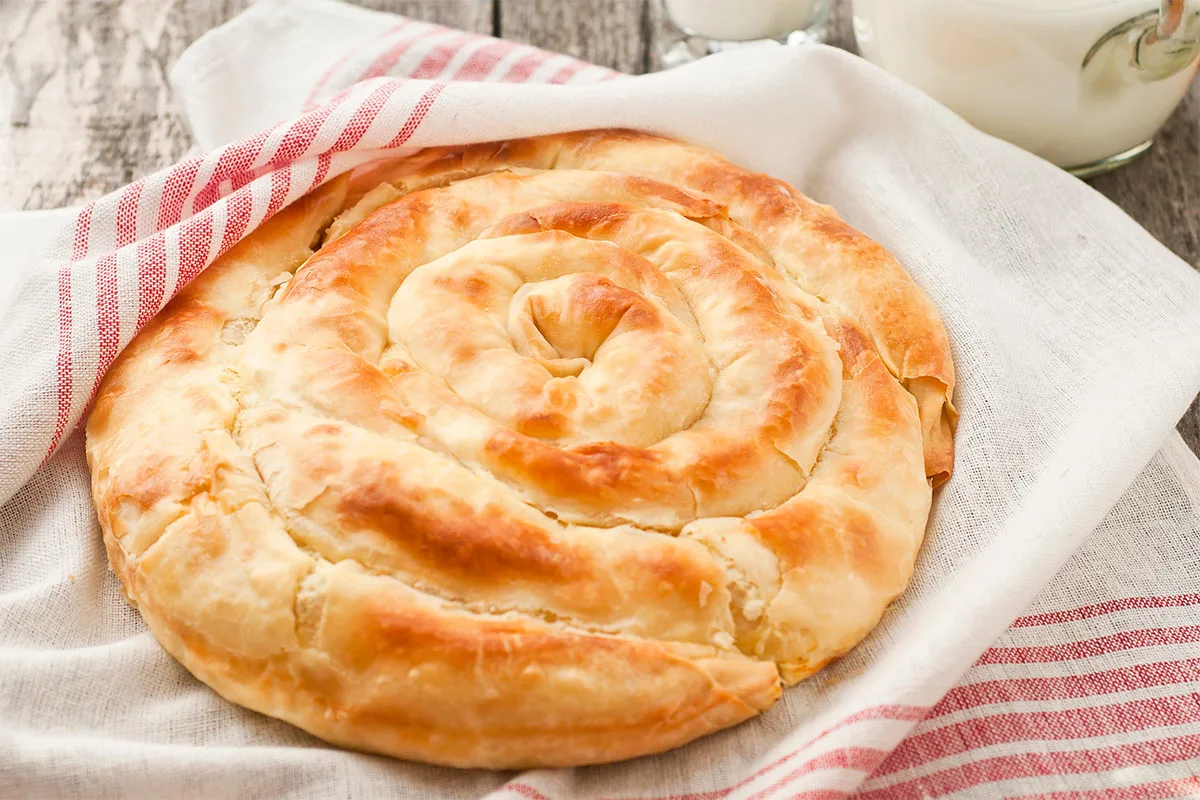
Traditional Bulgarian banitsa is made of thin layers of filo pastry filled with eggs, cheese, and sometimes meat or vegetables.
I love how it can also be made with spinach, leeks, or even pumpkin.
Garash Cake

One of the top Bulgarian cakes, Garash cake features walnut meringue sponge and chocolate ganache. The cake plates are made with egg whites, walnuts, and powdered sugar.
This flour-free cake is ideal for those following a gluten-free diet. And to top it off, Garash cake features a luxurious velvety chocolate coating.
🧀Bulgarian Cheese
From soft and creamy to firm and aged, Bulgarian cheese comes in many forms. It’s generally made from cow, sheep, or goat milk.
The most popular types are kashkaval and sirene cheese.
Sirene
Sirene cheese is a popular type of white brined cheese made from sheep’s milk. It’s used in salads, soups, pastries, and even grilled or fried on its own.
Sirene has a crumbly texture which works well in Shopska salad, banitsa and other traditional dishes.
The protein and calcium content and unique taste of this white cheese make it even more appealing.
Kashkaval

Kashkaval is a yellow cheese made from cow’s milk, similar to cheddar or gouda. It can be eaten alone, melted on sandwiches, or used in Bulgarian dishes.
I love pastries for breakfast and kashkaval works amazingly in them, as well as on toasts and pizzas.
I hope you enjoyed Bulgarian cuisine at its finest. Don’t forget to try out some of these recipes!
Also, check out the best Bulgarian drinks to go with your meal.

20 Best Traditional Bulgarian Food Options
Ingredients
Bulgarian Starters and Side Dishes
- Shopska Salata
- Snezhanka Salata (Snow White Salad)
- Mish-Mash
- Lyutenitsa
Bulgarian Meats and Mains
- Bulgarian Grilled Meatballs (Kyofte)
- Drob Sarma
- Sarmi (Stuffed Grape Leaves)
- Kebapche
- Meshana Skara (Mixed Grill)
- Bulgarian Moussaka
Bulgarian Soups and Stews
- Traditional Bulgarian Soup with Bacon (Shopki Style Soup)
- Tarator
- Shkembe Chorba (Tripe Soup)
- Bob Chorba (Bean Soup)
Bulgarian Pastries and Desserts
- Mekitsi (Bulgarian Fried Dough)
- Bulgarian Pitka Bread (Koledna Pitka)
- Banitsa
- Garash Cake
Bulgarian Cheese
- Sirene
- Kashkaval




